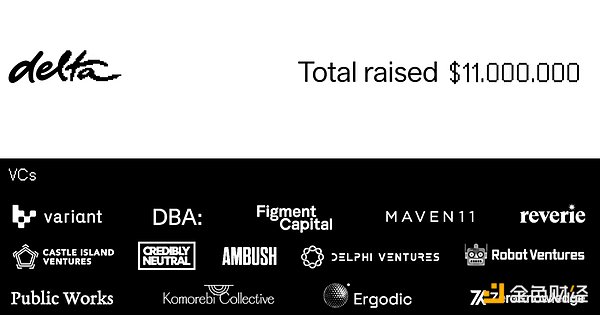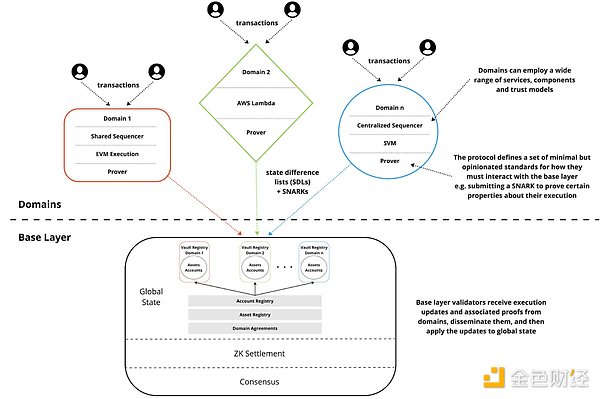Note: On October 9, 2024, delta network announced the completion of a $11 million seed round of investment, led by Variant and DBA, with participation from Figment, Castle Island, Delphi, etc.

According to delta official information, delta network is a network of networks that shares global state and is locally customizable. It is a new type of permissionless network. It solves the sovereignty and interoperability of applications through zk settlement.
So what exactly is delta network? Why are crypto VCs rushing to invest in delta network? Please see below.
What is delta network
Source: delta team,Compiled by: Golden Finance
Today's developers have to make a choice: they can build within the constraints of a cookie-cutter blockchain, or they can build their ideal product as an application chain, but face the challenge of transforming interoperability and bootstrapping their own ecosystem.
Developers should not be forced to make this choice. If we could redesign blockchains with all the knowledge we have today, we think they would look like delta.
What does delta look like
delta believes that developers should have maximum local control without sacrificing global connectivity.
delta is a network of autonomous execution environments connected by a decentralized, censorship-resistant base layer. delta separates (1) execution and ordering from (2) data availability and settlement. (1) occurs on domains (similar to Rollups/execution sharding), and (2) is provided by a network of validators operating the base layer. The sum of these components forms a unified global state machine.
While the global state is shared, a domain has full control over its blockspace. Domains can be application-specific or general-purpose computing platforms; they can use any existing virtual machines or develop their own custom ones; their operating models can be decentralized, centralized, or even permissioned. Any application, enterprise, or service provider can set up its own domain without permission. Their users can pay fees in any token, or not at all, through off-chain subscriptions.
Users gain censorship resistance from the base layer. They decide how to use their assets, and maintain self-custody capabilities - their funds are safe, and they have the right to exit domains without permission. Assets exist on the base layer, so there is no need for each domain to implement it separately.
The base layer facilitates native interoperability between domains. For users, Delta provides an experience that allows you to move assets between domains instantly, almost for free, and without the need for bridges.
The key to achieving these properties is zero-knowledge settlement. Similar to rollups, domains can take many forms, but all settle to the same base layer. Unlike rollups, they achieve settlement by verifying zero-knowledge proofs that are integrated directly into the base layer. This approach of "built-in" zero-knowledge settlement enables unprecedented levels of global interoperability between local networks. Domains can interact with each other, even atomically, without the need for global coordination like blockchains.
delta's state model supports a leaderless consensus protocol that outperforms any blockchain to date. Domains in delta inherently isolate the ability to change global state based on spending. Because of this restriction, no full ordering of transactions is required on the base layer. Without ordering, domains can continuously stream out their state changes using the Minimal Byzantine Reliable Broadcast (BRB) protocol. In addition to reducing the communication overhead of each transaction, delta's leaderless, out-of-order consensus is more powerful and more scalable than the fully-ordered consensus implemented by all blockchains to date. Unlike these systems, delta can scale throughput linearly by simply adding more machines.

Solving Cryptocurrency’s Biggest Problem
We believe in a world where platforms and applications have as much optionality as Web2, and are as composable as smart contracts on the same blockchain. Unfortunately, appchains and rollups don’t have the right form factor. They require complex interoperability solutions to “glue” separate blockchains. The downsides of this approach currently far outweigh the benefits of sovereignty.
As an example, consider the challenges new chains face in onboarding users.
All on-chain applications should provide a seamless experience for new users to deposit assets like stablecoins. Today, new chains chosen to facilitate this experience present significant challenges:
1. Getting stablecoin issuers to deploy natively on your chain is non-trivial in terms of cost and process. This option is only for the most well-capitalized and resourced projects.
2. Requiring users to bridge from the rollup’s settlement layer has great security, but creates significant friction for any user who doesn’t already have a stablecoin on the rollup’s settlement layer.
3. Appchains and Rollups can work with third-party bridges, but there are significant drawbacks to this approach. Using just one provider can present unacceptable security risks, but using multiple providers results in a poor user experience as users have to account for multiple versions of the same underlying asset.
Because it is an integrated system, delta solves the most important challenges associated with launching an appchain or rollup:
Distribution
On an integrated chain, attracting users and liquidity is a positive-sum effort for both the chain and its applications. On Lisk, builders are on their own - users and assets cannot be shared.
On delta, assets and users are shared globally - once they are onboarded to delta, they are accessible to all domains built on delta. At the same time, domains retain maximum control to own and optimize their own user experience.
Interoperability
Users want to interact with multiple applications simultaneously without any friction. To facilitate this experience, Lisk must reintroduce intermediary services (third-party infrastructure and liquidity providers) to abstract away a lot of complexity. Blockchains are designed to eliminate these intermediaries, but each layer of abstraction takes us further and further away from this original value proposition.
On delta, because state is shared globally, domains no longer need intermediaries to establish connections with other domains. Users can move from one domain to another without any friction that comes with intermediaries or routing complexity.
Barriers to Entry
Building and maintaining an appchain or rollup requires more cost and resources than deploying a set of smart contracts on an integrated chain.
On delta, domains can be more lightweight than other forms of appchains and rollups. Unlike rollups, domains do not have to prove full execution paths and/or handle long withdrawal periods associated with fraud proof dispute periods. Unlike standalone appchains, domains do not need to bootstrap a validator set.
Going back to the stablecoin accessibility challenge mentioned above, this challenge does not exist for domain builders on delta. On delta, stablecoin issuers only need to deploy once, and all domains have equal access to their holders and liquidity without sacrificing control and reasoning about interoperability complexity.
Vision of delta
Delta will enhance appchains and horizontal scaling vision more broadly. But delta not only solves the problems of existing approaches, it also creates a completely new design space that has never been seen before.
delta provides its users with two inalienable rights - the right to self-custody and the right to exit without permission. With these guarantees, delta can safely reintroduce a range of trust models at the execution layer. For the first time, blockchains can provide permissioned services while still ensuring that user funds are completely safe and can be withdrawn at any time. This enables a new category of enterprise, gaming, and even government blockchains to exist on public networks alongside trustless and decentralized blockchains, with unprecedented levels of interoperability between them.
Variant: Why we led delta's $11 million seed round
Author: jessewldn.eth, co-founder of Variant Fund; Cooper and Alana Levin, partners of Variant Fund; Translated by: Golden Finance
On October 9, 2024, Variant is pleased to announce that it has led delta's $11 million seed round with DBA.
For the past decade, the blockchain industry has been constantly debating the right architectural tradeoffs — on X, in research forums, and through actual implementations of these multi-billion dollar systems. We’ve seen a plethora of networks exploring this new paradigm, aiming to carve out a unique position in the competitive landscape.
It’s now clearer than ever that L1 blockchains as single execution environments will not scale to the inevitable on-chain future with billions of active users. Ethereum first formally acknowledged this in 2020, when Vitalik released his “Rollup-centric roadmap.” Rather than scaling the L1 network horizontally through sharding or increasing hardware requirements, Ethereum took a path to vertical scaling. Solana shares similar architectural traits, positioning their version of Rollup and vertical scaling roadmap as “network scaling.” There’s even meaningful momentum to build similar systems on top of Bitcoin, on the back of growing awareness of the cultural phenomenon of op_cat and taproot wizards.
These trends are clear and pervasive. The current state of multi-billion dollar infrastructure projects is that they all have to adapt quickly to support the next generation of on-chain applications and users — dealing with large amounts of technical debt and the difficult reality of having to ensure backward compatibility first. Ultimately, this leads to poorly designed solutions that, in hindsight, may look more like Rube Goldberg machines than the future of finance.
But the past decade of research and effort has proven fruitful. We now understand how to vertically scale blockchain networks through ZK cryptography and succinctly verify computations without re-executing them. We have a number of virtual machines and execution environments that offer different capabilities beyond the Ethereum VM. By combining these insights, without the burden of technical debt or the constraints of preserving backward compatibility, we can create a new foundation for future applications.
About delta
delta is a novel network of networks that balances interoperability, customizability, and sovereignty — designed from the ground up with a clear view on how blockchains should scale vertically leveraging the past decade of research and the latest in zero-knowledge cryptography.
delta takes the best features of integrated architectures like Solana and combines them with the expressiveness and customizability of a more modular ecosystem. Developers of all skill levels can leverage application-specific “domains” that can run any type of custom logic in any programming environment. These domains can be as simple as a cloud function running in a hosted environment, or a fully permissionless rollup, or anything in between. As long as a domain adheres to a minimal set of globally defined rules — like providing specific proof that a transaction has valid signatures and complies with account spending permissions — it will be able to leverage this infrastructure, share accounts and assets, and interoperate with other domains. Fundamentally, shared state, along with improved interoperability, solves the cold start problem that affects those who want to roll out their own application-specific infrastructure but don’t yet have enough adoption, distribution, or visibility to attract an initial user base. This solves one of the main friction points of modular ecosystems (fragmentation) while allowing for scale and seamless user experiences for integrated solutions.
We believe delta will power the next generation of application-specific infrastructure and usher in a new era of innovation. The network's implementation of a CRDT-based state model and "order-less" consensus protocol allows for unique performance optimizations that have not yet appeared in the trade-off space. The team has just the right combination of technical and business aspects to bring this vision to market, consisting of computer scientists, protocol engineers, and former research directors of major digital asset institutions. Team members include delta founder Ole, Castle Island investment member Ria, Eigen Foundation advisor and ReverieVC partner Myles, etc.
We are happy to support Ole, Ria, Myles and the broader team on this journey.
 Kikyo
Kikyo






